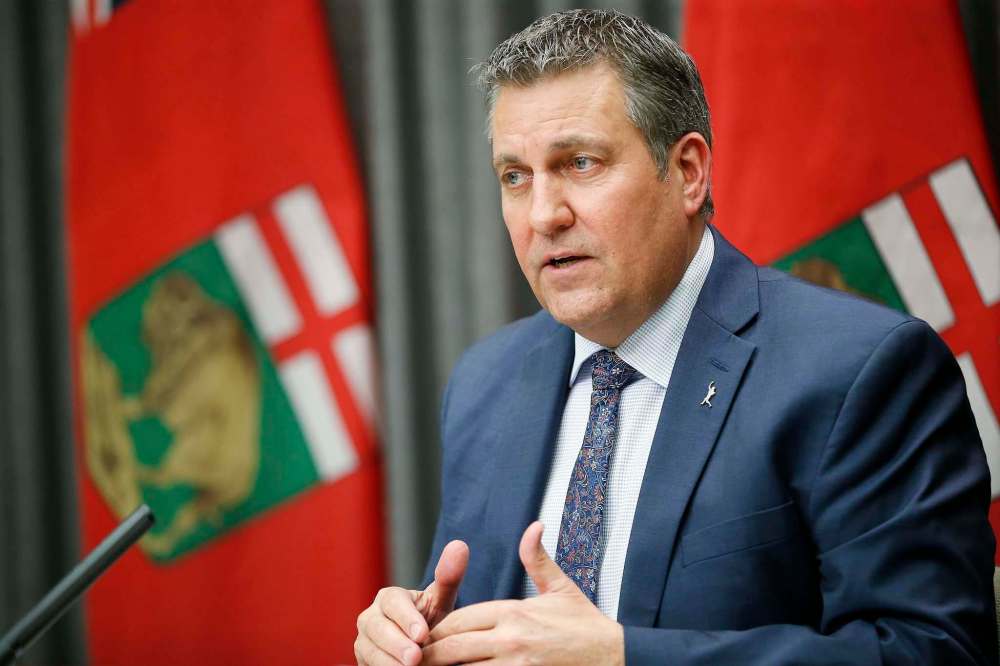Province pushes for wage freeze on non-teaching staff
Advertisement
Read this article for free:
or
Already have an account? Log in here »
To continue reading, please subscribe:
Monthly Digital Subscription
$0 for the first 4 weeks*
- Enjoy unlimited reading on winnipegfreepress.com
- Read the E-Edition, our digital replica newspaper
- Access News Break, our award-winning app
- Play interactive puzzles
*No charge for 4 weeks then price increases to the regular rate of $19.00 plus GST every four weeks. Offer available to new and qualified returning subscribers only. Cancel any time.
Monthly Digital Subscription
$4.75/week*
- Enjoy unlimited reading on winnipegfreepress.com
- Read the E-Edition, our digital replica newspaper
- Access News Break, our award-winning app
- Play interactive puzzles
*Billed as $19 plus GST every four weeks. Cancel any time.
To continue reading, please subscribe:
Add Free Press access to your Brandon Sun subscription for only an additional
$1 for the first 4 weeks*
*Your next subscription payment will increase by $1.00 and you will be charged $16.99 plus GST for four weeks. After four weeks, your payment will increase to $23.99 plus GST every four weeks.
Read unlimited articles for free today:
or
Already have an account? Log in here »
Hey there, time traveller!
This article was published 01/04/2021 (1717 days ago), so information in it may no longer be current.
Citing budget restraints amidst the COVID-19 pandemic, the province has asked school boards to participate in an “all-hands-on-deck” approach across the public sector to minimize the deficit by negotiating a two-year wage freeze with non-teaching staff.
On Thursday, the Manitoba PC caucus published a letter outlining a new bargaining mandate for boards who negotiate with approximately 80 unions which represent educational assistants, custodians, bus drivers and other school employees across the province.
The letter, signed by Education Minister Cliff Cullen and Finance Minister Scott Fielding, was sent to school board chairs and superintendents, with employee bargaining agents copied, earlier this week.

The province has proposed divisions negotiate new “four-year renewal cycle” agreements, consisting of a wage freeze for the first two years, followed by a 0.75 per cent bump, and a one per cent increase in the final year.
The terms mirror the contents of Bill 28, legislation that sought to freeze public-sector worker wages, which was struck down in a court last year. The Pallister government is currently appealing the ruling.
“The surrounding context is critical,” states the letter, “On behalf of all Manitobans, government continues to address the unprecedented challenges caused by the COVID-19 global pandemic.”
The letter also states the mandate should assist with ongoing budgetary processes in school divisions and enable additional transition planning, as part of the newly-announced education reforms.
NDP Leader Wab Kinew questioned the timing of the letter — amidst a pandemic during which support staff have stepped up to both keep schools safe and struggling students learning — during a scrum Thursday.
“To me, it shows that what Bill 64 and this education reform is going to be all about is just cutting costs, not actually helping kids in the classroom,” Kinew told reporters at the Manitoba legislature.
A spokeswoman for bus drivers in the Winnipeg School Division echoed those sentiments.
“We’re not impressed,” said Bea Bruske, secretary-treasurer of UFCW Local 832, which represents nearly 100 drivers.
Given the terms are the same as Bill 28 — terms bus drivers fought during a strike earlier in the school year, Bruske said the province is using the pandemic as an excuse to “ram (them) through.”
It remains unclear what exactly the bargaining process will look like for non-teaching employees when English boards are replaced with a centralized education authority in summer 2022. The Manitoba Teachers’ Society will represent all teachers in collective bargaining with the province when that happens.
“There’s more questions than answers and I think doing this during a pandemic is completely reckless and it’s not taking the needs of the students and parents and workers, quite frankly, into consideration at all,” Bruske added.
MTS president James Bedford said in a statement Thursday the latest mandate letter amounts to further “government interference and intimidation.”
maggie.macintosh@freepress.mb.ca
larry.kusch@freepress.mb.ca

Maggie Macintosh reports on education for the Winnipeg Free Press. Funding for the Free Press education reporter comes from the Government of Canada through the Local Journalism Initiative.

Our newsroom depends on a growing audience of readers to power our journalism. If you are not a paid reader, please consider becoming a subscriber.
Our newsroom depends on its audience of readers to power our journalism. Thank you for your support.

